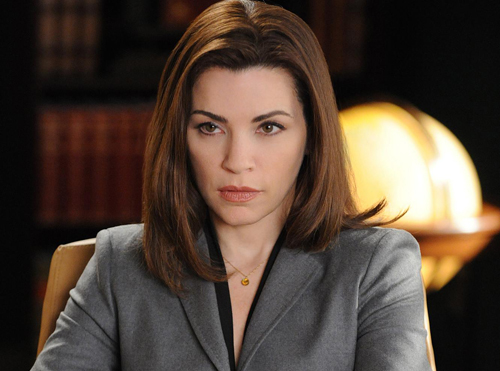“You know the show’s demographic is 57 year old women, right?”
That’s what Miss Scriptshadow said to me when she found me watching my third episode of The Good Wife in a row. I tried to explain to her that I’d merely been tired of hearing how good the writing was on The Good Wife and I had to check it out for myself for research purposes. That was all. Strictly research.
But then I realized I wasn’t just lying to Miss Scriptshadow. I was lying to myself. I was a Good Wife addict. The show that I never thought I’d watch, much less enjoy, had become my favorite show along with The Walking Dead. How did this happen? The plight seemed implausible. I HATE these kinds of shows. “Ooh, are they gonna prove that the murderer’s shoe didn’t fit in time to win the case!???” I don’t care. I have something called intelligence which allows me to know that, yes, they will prove the shoe fits, and then afterwards we’ll learn that it was really THE WIFE who did it.
That’s what I was expecting to find when I started watching this TV version of crack. And in a few instances, I was right. But what I learned through this particular law procedural, is that while the individual cases that come about each episode are usually cliché, it’s the things that happen outside the cases that make the show good.
For those who don’t know what The Good Wife is about, it follows Alicia Florrick, the wife of prominent and popular State’s Attorney, Peter Florrick, after he’s involved in an ugly scandal, fixing cases through a complicated web of prostitution, prostitutes that he himself slept with. Peter goes to jail, and Alicia, who’s up until this point been the “good wife” and mother to her son and daughter, must finally do something with that law degree she secured forever ago in order to support her family.
Luckily, Alicia’s old law school boyfriend, Will Gardner, is now a partner at his own firm. He decides to take a chance on Alicia as a junior associate, something that raises a few eyebrows in the firm. Is Will bringing her in because she’s good? Or is Will bringing her in because he’s still in love with her? The series is populated with lots of other fun characters, like the cryptic private investigator, Kalinda, and the tries-too-hard first year associate Cary, and like any good show, is a joy to watch in that you never know what to expect. The Good Wife constantly surprises you.
You don’t really understand the power of a television show until you’ve seen it done right. And The Good Wife does pretty much everything right. Starting with its levels.
I admit that I’m completely making this vocabulary up because I don’t know the TV vernacular as well as I do features, but I’m calling it “The Level Approach.” The Good Wife taught me that there are three LEVELS of exploration in every episode. The first level is the case itself. We’ll call this the episode’s plot. While there will be other things going on, sometimes more important things, this level is the engine that drives the episode. The second level is what happens at work (in this case, the law firm). This includes all the interpersonal relationships that are occurring at the firm. For instance, Cary has a thing for Kalinda, who doesn’t like Cary. So when they work together, there’s an undercurrent of tension. Finally, there’s the home level. What happens to these people when they go home (their personal lives)? For the most part, this level follows the main character (in this case, Alicia) and her problems with her family – how her two kids are dealing with this. As well as her complicated relationship with her husband, who she still loves, but who has betrayed her.
Now when each of these levels is dealt with separately, they’re only moderately entertaining. It’s when they INTERWEAVE with one another that the show excels.
Let me give you an example. In the second episode of the series, a prostitute comes to the firm complaining to have been raped by the son of a rich Chicagoan. On its own, this is a pretty uninteresting case. But who’s put on the case? Alicia Florrick. Alicia’s husband, of course, was cheating on her with prostitutes. Now, she’s forced to defend one. Her home life is now clashing with her work life. You see how a ho-hum case/episode can all of a sudden become exciting?
As the season moves on, Alicia is hearing more and more that her husband, Peter, might have been set up by the new State’s Attorney, Glenn, who orchestrated her husband’s ouster in order to steal his job. Then one day, the firm gets a new client. It’s Glenn’s wife, who wants a divorce. And she wants Alicia to represent her. As Alicia looks into the divorce case, she comes across information that might help her husband’s case. Which is complicated, as she’s still not sure she even wants her husband out of jail. Once again, her home life is clashing with her work life.
And really, when you think about it, you don’t have to stop at three levels. Every show concept will be unique, allowing you to add a fourth, or even fifth level. You could argue that Peter’s storyline (trying to get out of jail and get his State’s Attorney job back) is the fourth level in The Good Wife, and the writers do an excellent job of integrating that storyline into the cases as well. For example, in one episode, the law firm needs a judge’s help. That judge happens to be a good friend of Peter’s. So they need to ask Peter to put a call in.
The great thing about The Good Wife is that they only include a choice if it adds more conflict to the show. Take the example above. It’s not as simple as the firm asking Peter to make a call. Their only connection to Peter is through Alicia. Will has to then ask Alicia if she’ll tap her husband’s connections. This makes Alicia question if she’s been hired for the right reasons. Is she hired because she has access to one of the most powerful men in the city? Or has she been hired because she’s genuinely good? Everything about this show is so intermixed and intermingled. There’s never a straightforward narrative to any of the cases.
Now Miss Scriptshadow argues that it’s all too soapy. Will liking Alicia. Prostitutes coming out with stories in the media. But I pointed out that The Walking Dead (her favorite show) is one of the most soapy shows out there, and really, all the best shows have soapy elements. You can’t NOT have love stories and betrayal and the occasional character getting pregnant. She says The Walking Dead is different cause there’s zombies. I’m not sure how to respond to that.
Another thing I talk a lot about on the site is “The Choice.” This is when you give your character two choices that are equally bad. It’s a fun place to put your character because the audience loves watching them squirm their way to a decision. The Good Wife is one of the best shows (or movies) I’ve ever seen at this. They must talk about it specifically in the writer’s room because they clearly try to include it at every opportunity.
Let me give you an example. In the fourth episode of the series, Peter’s lawyer, who’s trying to get Peter out of jail, wants Alicia to testify that Peter made untruthful statements not because he was hiding illegal activity, but rather to hide his infidelity from his wife. In other words, Alicia is being asked to help her husband by confirming an action that kept her in the dark about his cheating. If she helps him, she basically endorses this behavior. If not, her husband stays in jail. Complicating matters is that her kids are desperate to have their father home.
The best of these choices are always ones where if you put yourself in the character’s shoes, you wouldn’t know what to do. If, however, they’re “paper decisions,” decisions that look fine on paper but, really, everyone knows what the best choice is, then you’re not doing your job.
I didn’t even get into the great character-writing here. I often hear the tip, “If you cover up all the characters’ names, you should be able to know who’s talking just by their dialogue.” This certainly sounds good, but it’s rarely 100% applicable. There are always going to be characters who sound neutral enough that their dialogue can be confused for others’. But The Good Wife is the one example where you really see this. The selfish and direct Kalinda. The uber-confident Peter. The motherly Alicia. The try-hard Cary. The stately Alicia (one of the partners). The calm and collect Will. I mean you really could cover these characters’ names and know who’s talking.
The only question I have for this show is, can it keep it up? I’m on Episode 18 of the first season. I understand they’re on their 6th season now at 23 episodes a pop. Does it devolve into Gray’s Anatomy territory where, by season 2, they’re doing Prom Hospital? Or are they able to keep up this amazing level of quality? Let me know so I can either raise or lower my expectations.
And finally, I need to know what club I’m in now. All these shows/movies have cool names for their watchers. Twihards. Browncoats. What am I now? Am I a Goodwifer?
Goodwifers unite!




